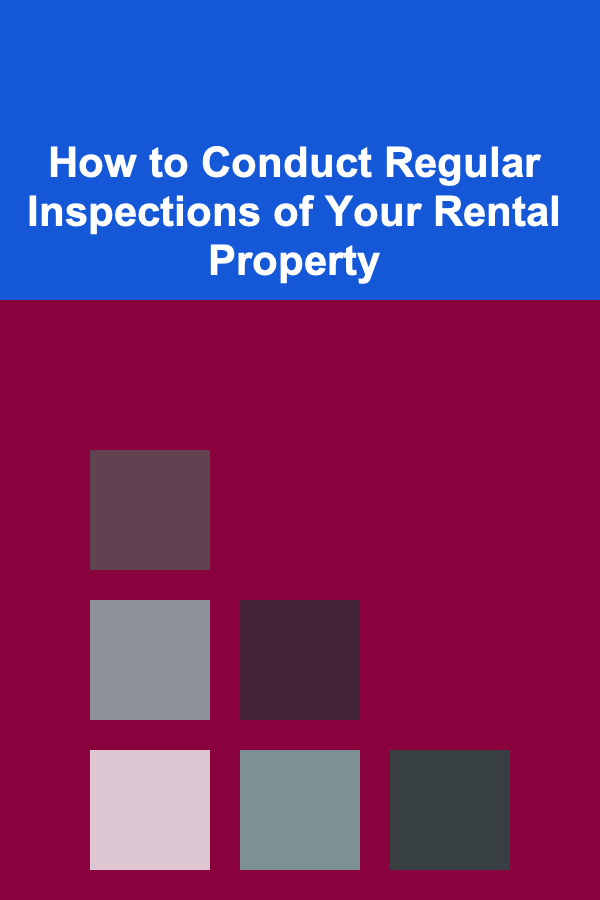
How to Conduct Regular Inspections of Your Rental Property
ebook include PDF & Audio bundle (Micro Guide)
$12.99$7.99
Limited Time Offer! Order within the next:

Regular inspections of rental properties are an essential part of property management. They help ensure the property is being well-maintained, identify any potential issues before they become costly repairs, and foster a healthy relationship between landlords and tenants. This article will guide you through the process of conducting regular inspections, covering their importance, best practices, legal considerations, and tips for making them efficient and effective.
Importance of Regular Inspections
1. Preventing Costly Repairs
One of the main benefits of regular inspections is the ability to catch maintenance issues early. Small problems like leaks, cracks, or mold growth can easily escalate into significant and expensive repairs if left unnoticed. Regular inspections allow you to detect these issues while they're still manageable, preventing further damage and saving you money in the long run.
For example, spotting a small plumbing leak during an inspection can save you from dealing with water damage, mold remediation, or even structural issues. Similarly, inspecting appliances or HVAC systems can help ensure they are functioning optimally, avoiding breakdowns that may require costly emergency repairs.
2. Maintaining the Property's Value
Regular inspections help maintain the value of your property by ensuring it remains in good condition. Keeping track of wear and tear allows you to plan for repairs or upgrades before they impact the overall aesthetics or functionality of the property. Whether it's repainting, replacing carpets, or updating appliances, regular inspections give you an accurate picture of what needs attention.
Moreover, by consistently maintaining the property, you ensure that it continues to attract and retain high-quality tenants. A well-kept property also has higher resale value if you decide to sell it in the future.
3. Ensuring Tenant Compliance
Inspections provide a good opportunity to ensure that tenants are complying with the terms of their lease agreements. You can check that they are following property rules and regulations, such as not causing damage, not smoking in non-smoking areas, or adhering to pet policies.
Additionally, inspections allow you to ensure tenants are not subletting or engaging in illegal activities on the property. Keeping the property in compliance with local laws can help avoid legal issues and protect your investment.
4. Improving Tenant Relations
While inspections can seem intrusive, they can also improve the relationship between tenants and landlords when conducted properly. Regular inspections demonstrate that you care about the property and are invested in maintaining a safe and comfortable living environment for your tenants.
By addressing small issues promptly during inspections, you show tenants that you take their concerns seriously and are committed to making their rental experience positive. This can lead to longer tenant retention, positive reviews, and referrals.
5. Legal and Insurance Requirements
In many regions, landlords are legally required to ensure that rental properties meet certain health and safety standards. Regular inspections help ensure compliance with these laws. For instance, if your property has any fire hazards, faulty electrical wiring, or health risks, an inspection will help you identify and fix them before they lead to serious problems.
Insurance companies may also require regular property inspections to maintain coverage or avoid claims denial. Keeping your property in good condition and well-documented can help in case of any insurance claims.
How to Plan for Regular Inspections
1. Establish a Clear Inspection Schedule
The first step in conducting regular inspections is establishing a clear schedule. How often inspections should occur depends on factors like the condition of the property, the lease terms, and local laws. However, most landlords conduct inspections once or twice a year. Some may perform quarterly inspections for added peace of mind, especially in properties with more complex maintenance needs.
If you are unsure of the appropriate inspection frequency, consult your local rental laws or industry standards. Be mindful that conducting inspections too frequently may cause tenant discomfort, while neglecting inspections could lead to undetected issues.
2. Notify Tenants in Advance
Most rental agreements require landlords to provide tenants with adequate notice before entering the property for an inspection. The notice period varies by location but typically ranges from 24 to 48 hours. Failing to provide sufficient notice may violate tenants' rights, leading to legal issues.
In addition to the legal requirement, giving tenants notice helps them prepare for the inspection. It also shows respect for their privacy and encourages cooperation during the process.
3. Create a Checklist
Having a checklist ensures that your inspections are thorough and consistent. A checklist should cover all areas of the property, both inside and outside, to ensure no aspect is overlooked. The checklist should include things like:
- Exterior: Roof condition, gutters, downspouts, landscaping, driveway, and fencing.
- Interior: Walls, ceilings, floors, windows, doors, lighting, plumbing, and appliances.
- Systems: HVAC, plumbing, electrical systems, and smoke detectors.
- Safety: Fire exits, locks, security systems, and carbon monoxide detectors.
- Signs of tenant misuse: Unreported damage, pets, unauthorized occupants, or alterations to the property.
A well-structured checklist helps ensure that you perform comprehensive inspections each time, reducing the chances of missing any issues.
4. Use Technology to Streamline Inspections
Property management software and mobile apps can make inspections easier and more efficient. Many platforms offer tools to help landlords schedule inspections, track maintenance requests, and keep detailed records of inspection findings. Some apps even allow you to take photos or videos and store them in a digital report, making it easier to document the property's condition and any issues that arise.
Utilizing technology helps you stay organized and ensures you can access inspection records quickly, which is helpful for future reference, tax purposes, or legal compliance.
How to Conduct the Inspection
1. Prepare for the Inspection
Before conducting an inspection, prepare by reviewing the tenant's lease agreement, previous inspection reports, and any outstanding maintenance requests. This helps you to identify any ongoing issues and track their resolution. If there were any problems noted during the previous inspection, check to see if they have been addressed.
If the tenant has submitted any maintenance requests, make sure to inspect those areas more closely to determine if repairs are needed.
2. Start with the Exterior
Begin the inspection by walking around the exterior of the property. Check the following:
- Roof: Look for damaged shingles, missing tiles, or other signs of wear that could cause leaks or water damage.
- Landscaping: Assess whether the yard is being maintained properly. Are trees, bushes, or grass overgrown? Is there any damage to the driveway, sidewalks, or fences?
- Gutters and Downspouts: Ensure gutters are clean and functional. Blocked gutters can lead to water damage or leaks.
- Foundation: Look for cracks or signs of structural issues around the foundation.
- Windows and Doors: Check for any signs of damage, such as broken locks, cracked glass, or frames that need caulking.
Taking note of these areas can help prevent larger, more costly repairs in the future.
3. Inspect the Interior
Move inside to inspect each room carefully. Look for any signs of tenant damage, misuse, or neglect. Some key areas to focus on include:
- Walls and Floors: Check for holes, stains, or other damage caused by tenants. Look for signs of wear or mold in areas with high moisture.
- Plumbing: Test faucets, showers, and toilets for leaks or water pressure issues. Check under sinks for signs of water damage or leaks.
- Electrical Systems: Ensure that all outlets, light switches, and fixtures are working properly. Test smoke and carbon monoxide detectors.
- Appliances: Check the condition and functionality of appliances like the oven, refrigerator, and dishwasher. Look for any signs of damage or malfunction.
- HVAC Systems: Ensure that heating, ventilation, and air conditioning systems are operating efficiently. Replace filters if necessary.
4. Assess Safety Features
Ensure that all safety features are functioning correctly, including:
- Fire Extinguishers: Verify that fire extinguishers are present and fully charged.
- Smoke Detectors: Test smoke detectors to ensure they are in working order.
- Carbon Monoxide Detectors: Verify that carbon monoxide detectors are present, especially in areas with gas appliances.
- Locks and Deadbolts: Check that all doors and windows have secure locks to prevent unauthorized access.
5. Document Everything
During the inspection, take detailed notes and photos of any issues you identify. This documentation will be invaluable if any disputes arise later, and it can also serve as a reference for future inspections. Keep records of the date and findings of each inspection, and use these to track the property's condition over time.
If repairs are needed, make sure to include a timeline for when these repairs will be completed. Documenting these issues ensures transparency and helps protect both you and the tenant.
Handling Problems Identified During Inspections
After the inspection, take the time to assess the severity of the issues identified. If the problems are minor, you may be able to resolve them quickly. However, if more significant repairs are needed, it's important to take action promptly to prevent further damage or complications.
- For Minor Repairs: Schedule repairs as soon as possible. For example, patch up small holes in the walls, clean or replace air filters, or fix leaky faucets.
- For Major Issues: If you discover major issues like a roof leak or electrical malfunction, hire professionals to address the problem immediately. Provide tenants with clear communication about the repairs and timeline for resolution.
Make sure to follow up with tenants after repairs are completed to ensure their satisfaction.
Legal Considerations
While regular inspections are essential for property maintenance, it's important to follow local laws and regulations. Many regions require landlords to give a specific notice period before entering the property for inspections. Failing to adhere to these laws can result in fines or legal disputes.
It's also essential to respect tenant privacy during inspections. Make sure to avoid excessive inspections, as this could be seen as harassment. The goal is to maintain a balance between protecting your property and respecting your tenant's right to privacy.
Conclusion
Regular inspections are a critical part of managing rental properties effectively. They help prevent costly repairs, maintain the property's value, ensure tenant compliance, and foster a positive landlord-tenant relationship. By planning ahead, being thorough, and documenting everything, you can conduct inspections that keep your property in excellent condition while protecting both your investment and your tenants' well-being.
A proactive approach to property maintenance will lead to long-term success in property management, ensuring that both landlords and tenants are satisfied.

How to Declutter Your Digital Life for Mental Clarity
Read More
How to Have a Family Nature Walk and Discovery Day
Read More
How to Host a Cozy Winter Party with Hot Drinks and Snacks
Read More
How to Refresh Your Living Room with Affordable DIY Decor
Read More
Leveraging Deep Learning to Build a Profitable AI Business
Read More
Top Used Car Buying Tips Every Shopper Should Know
Read MoreOther Products

How to Declutter Your Digital Life for Mental Clarity
Read More
How to Have a Family Nature Walk and Discovery Day
Read More
How to Host a Cozy Winter Party with Hot Drinks and Snacks
Read More
How to Refresh Your Living Room with Affordable DIY Decor
Read More
Leveraging Deep Learning to Build a Profitable AI Business
Read More